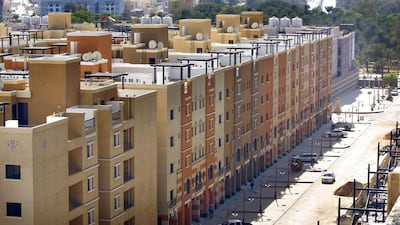The Public Investment Fund (PIF), Saudi Arabia’s sovereign wealth fund, has set up a real estate refinancing company aimed at boosting home ownership in the kingdom, which suffers from a shortage of affordable housing.
The Saudi Real Estate Refinance Company (SRC) will help to pump liquidity into the real estate financing market, which is forecast to rise to 500 billion Saudi riyals (Dh489bn) by 2026 from 280bn riyals this year. The company, which was launched in partnership with the ministry of housing and has received a licence from the Saudi central bank, the Saudi Arabian Monetary Authority (Sama), is expected to refinance up to 75bn riyals worth of mortgage debt over the next five years, reaching 170bn riyals by 2026.
_______________
Read more:
Saudi Arabia introduces measures to bolster mortgage financing
Saudi’s $250 billion construction market still offers greatest potential, says Meed
JLL foresees ‘watershed year’ for Saudi property market
_______________
“The company will act as an intermediary access point for investors, aligning the liquidity, capital and risk management requirements of real estate mortgage companies, with the risk acceptability and return on equity to meet investor targets,” the PIF said. “It endeavours to create stability and growth in the kingdom’s housing sector by injecting liquidity into the secondary mortgage market, improving standards and facilitating access to local and international financing sources.”
The new company falls in line with the kingdom's plans to double the percentage of real estate's contribution to GDP to 10 per cent by 2020 from a baseline of 5 per cent, according to the 2020 National Transformation Programme.
The programme, which will help to wean the kingdom off oil, also envisages raising Saudi ownership of homes to 52 per cent from a baseline of 47 per cent and boosting the contribution of real estate financing to non-oil GDP to 15 per cent from a baseline of 8 per cent.
The plan also sets a goal of tripling the percentage of residential units developed by approved real estate developers to 30 per cent by 2020.
“SRC will adopt a strategy of acquiring mortgage funds to increase financial capabilities and broaden the activities of real estate financing companies,” said the fund. “It will also work on linking the investment capital of foreign and local investors with the range of opportunities available in the kingdom’s growing housing market.”
The company will also issue bonds to real estate finance companies as securities backed by both short and long-term mortgage contracts.
The availability of more financing should help to address the housing shortage and accessiblity to financing, according to Craig Plumb, head of research at the broker JLL Mena.
“If more can be done to reduce costs by providing financing on more favourable terms, this will clearly help many of these who are currently priced out of the market,” said Mr Plumb, adding that reducing the cost of land for affordable housing projects is another step that needs to be taken.
Saudi Arabia has taken some steps lately to tackle the housing shortage problem.
Sama said in September that mortgage holders would be exempt from paying administrative fees when switching between floating loan rates to fixed ones and mortgage holders can also move from one lender to another at no extra cost.
In January, Sama also said it would allow mortgage finance companies to provide more funding to home purchases by raising the maximum loan-to-value ratio for home financing from 70 per cent to 85 per cent for citizens' first-home ownership only. The bank licensed a national home finance company, Bidaya, and introduced an affordable mortgage programme in conjunction with the ministry of finance. The government also approved a 2.5 per cent "white land tax" intended to prod encourage land owners to develop idle plots for residential use rather than hold on to their undeveloped properties.

